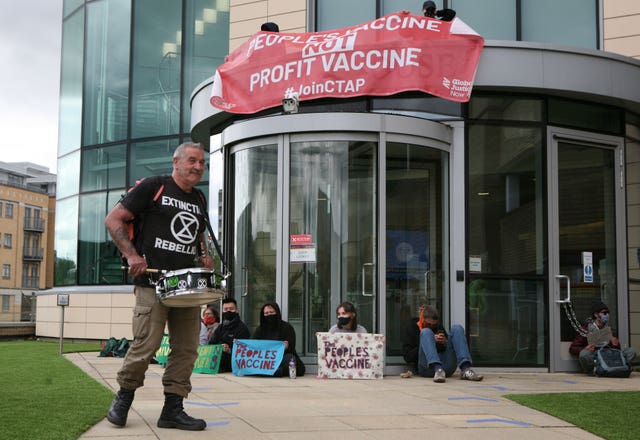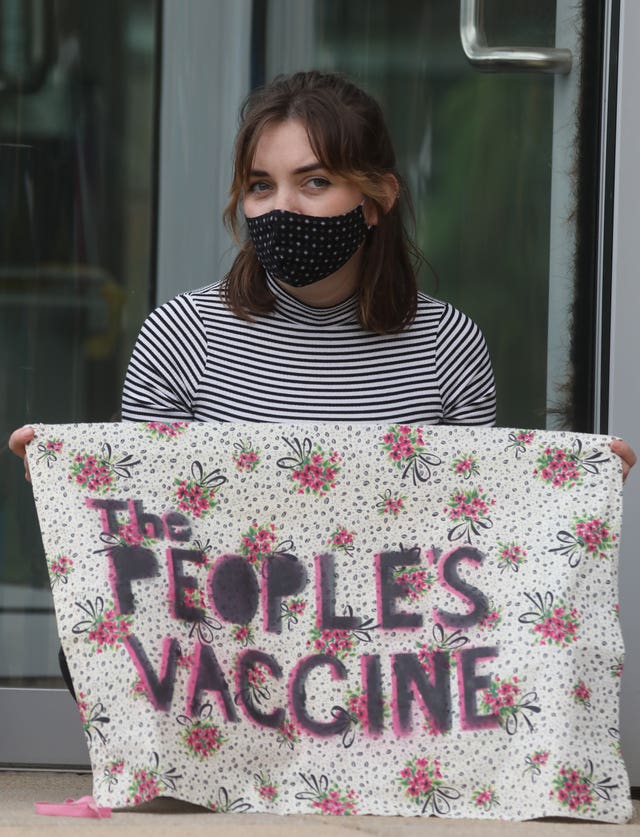Protesters call for AstraZeneca to share Covid vaccine technology
A protester chained himself to the door at the pharmaceutical firm’s Cambridge headquarters.

Protesters demanding that AstraZeneca share its Covid-19 vaccine technology have held a loud demonstration outside the pharmaceutical firm’s Cambridge headquarters.
A protester, who held held a sign which read “human life not profit,” chained himself to a door while others climbed on to the roof of the entryway and unfurled a banner which read “people’s vaccine not profit vaccine”.
Supporters played drums during the protest organised by Global Justice Now, which is calling for the British-Swedish company to commit to sharing the technology with the World Health Organisation (WHO).
Uniformed officers could be seen nearby.

Global Justice Now said the action, which coincided with AstraZeneca’s annual general meeting, also seeks to persuade Oxford University to make all of its future medical innovations open-licensed.
Oxford University and AstraZeneca have previously pledged to provide the vaccine at a not-for-profit basis across the world for the duration of the pandemic.
Cambridgeshire Police said four people are in custody, including a 17 year-old boy from Cambridge who was arrested on suspicion of assaulting an emergency worker, and that an investigation is ongoing.
The other three are a 20-year-old Essex woman and a 22-year-old person from Cambridge, who were arrested on suspicion of criminal damage, and a 49-year-old Cambridge woman held on suspicion of obstructing a police officer.
Nick Dearden, director of Global Justice Now, said: “Scientists at Oxford University, a publicly-funded institution, developed this lifesaving vaccine through a research and development process that was 97% publicly funded.
“The resulting vaccine should have been openly accessible to everyone, but AstraZeneca swooped in and privatised it.
“The UK is reaping the benefits of the highly effective vaccines that are now available, but people in low and middle-income countries are still dying daily by the thousands from Covid-19.
“AstraZeneca like to portray themselves as the good guys, but they’ve boycotted attempts to pool the vaccine knowledge they control just like all the other pharma giants – and now claim they have no time to share this knowledge globally.

“Today, we’re demanding AstraZeneca pool this publicly created knowledge so the whole world can ramp up production of these vaccines.”
The social justice organisation claims that AstraZeneca has not yet joined the WHO’s Covid-19 Technology Access Pool, which facilitates the sharing of technology for vaccines and treatments.
It comes as the group put up posters at bus stops across the UK over the weekend to highlight the level of public investment in vaccine research and development and the profits made by pharmaceutical companies.
When the University of Oxford and AstraZeneca announced the final clinical trial results for the vaccine in November 2020, they pledged to offer the vaccine on a not-for-profit basis across the world for the duration of the pandemic.
The organisations also committed to offering the vaccine to low and middle income countries on a not-for-profit basis “in perpetuity”.
An AstraZeneca spokesman said: “We agree with the view that the extraordinary circumstances of the Covid-19 pandemic call for extraordinary measures.
“AstraZeneca has risen to the challenge of creating a not-for-profit vaccine that is widely available around the world, and we are proud that our vaccine accounts for 98% of all supplies to Covax (the scheme created to pool the global vaccine effort).
“We have established 20 supply lines spread across the globe and we have shared the intellectual property and know-how with dozens of partners in order to make this a reality.
“In fact, our model is similar to what an open intellectual property model could look like.”





